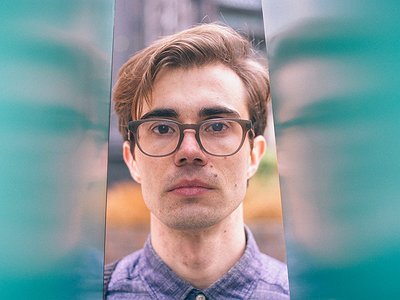Part 2
Could you take us through a day in your life, from a possible morning routine through to your work? Do you have a fixed schedule? How do music and other aspects of your life feed back into each other - do you separate them or instead try to make them blend seamlessly?
I don’t have a set routine, although I always try to begin my day with yoga and a decent walk before I sit down to do any work. I find it easier to write in the mornings, so unless there’s something really urgent I try to put off other things like practising, emails, etc, until later in the day. But if I’m facing a deadline that all usually goes out the window, and if I’m really in the middle of a piece I find that it preoccupies my thoughts even once I’ve left the studio. I’m trying to get better at separating my work life from my home life because, let’s face it, it’s not a lot of fun trying to engage with someone who is up in their head the whole time.
Could you describe your creative process on the basis of a piece or album that's particularly dear to you, please? Where did the ideas come from, how were they transformed in your mind, what did you start with and how do you refine these beginnings into the finished work of art?
I try to change the way I work from piece to piece in order to keep things fresh, at least as far as generating initial musical material. On Lines of Sight there’s a real mix of pieces that grew out of simple musical processes and ratios (e.g. a chord progression moving at multiple speeds simultaneously), and others that came about in a more organic way, usually beginning with me messing around on the piano looking for interesting shapes and sounds. One common thread is that, once I have an initial musical idea or plan, I’ll often create a graphic score to map out the full piece and its architecture and proportions. This serves as my road map, and from there I go about filling in the blanks, so to speak. I also spend a lot of time making subtractive edits to my music, I think of it being similar to sculpting in that regard.
There are many descriptions of the ideal state of mind for being creative. What is it like for you? What supports this ideal state of mind and what are distractions? Are there strategies to enter into this state more easily?
For me, it is about keeping my mind clear, focused, and calm, so finding things that enable that is really important to me. I think space is really significant - if my studio is messy or cluttered I find that energy seeps into my state of mind and I find focusing difficult. I think being patient and not trying to force ideas when they aren’t coming is important, too. A certain degree of detachment helps in that regard.
How is playing live and writing music in the studio connected? What do you achieve and draw from each experience personally? How do you see the relationship between improvisation and composition in this regard?
This is another topic I could ramble about for far too long. For me, it’s linked to the question about humans vs machines, in that I feel that a live performance is an opportunity to frame and interpret music with an emphasis on its human qualities, while music in the studio is an opportunity to transcend or at the very least add to those qualities to create something unique to that kind of listening experience. For me, improvisation relates much more to the former than the latter, as that linear, stream-of-consciousness-type mode of creation is profoundly, uniquely human. I’m really fascinated by blurring the line between the two - my ideal improvisation would sound as though it were composed, while my ideal composition would feel as though it could have been improvised.
How do you see the relationship between the 'sound' aspects of music and the 'composition' aspects? How do you work with sound and timbre to meet certain production ideas and in which way can certain sounds already take on compositional qualities?
A significant moment for me was when I realised that my interest in music was as a subset of an interest in sound as a whole. In hindsight, I remember when I first started writing music I would sit at the piano playing single chords and just bathe in the resonances, and being frustrated because I didn’t know that that type of experience could actually be as legitimate a basis for a piece as melody, harmony or rhythm. Now timbre is right at the heart of what I do, whether that’s in terms of orchestrating for acoustic instruments, or designing synth patches and effect chains. This was what eventually drew me to electronic and electroacoustic music, and in particular what I love about working with synthesisers - being able to shape a sound’s DNA. There’s a quote from Arvo Pärt about “a need to concentrate on each sound, so that every blade of grass would be as important as a flower” that really resonates with me in that regard.
Our sense of hearing shares intriguing connections to other senses. From your experience, what are some of the most inspiring overlaps between different senses - and what do they tell us about the way our senses work? What happens to sound at its outermost borders?
I completely agree with that statement, but I’m not sure how to articulate my own thoughts on it. Music and sound can stimulate so many different sensations: I’ve spoken to people who have had ‘sound baths’ and have experienced intense physical reactions from them; I read an article a little while ago about a study on the effects of pulse and rhythm on cognition, that found that people’s memory recall improved significantly when questions coincided with a steady beat; the positive effect of music on people suffering from dementia and Alzheimer’s disease is being documented more and more. These are just a few examples off the top of my head - it’s an incredibly multifaceted subject. I don’t feel I have the authority or depth of experience to say what that means, but I think that sound taps into something that goes far beyond human experience.
Art can be a purpose in its own right, but it can also directly feed back into everyday life, take on a social and political role and lead to more engagement. Can you describe your approach to art and being an artist?
I’ve never made music that was explicitly political, but that’s not to say that I wouldn’t. On the one hand I feel that an artist has a responsibility to reflect the place and time that they are in, to find the common threads of our existence that can pass through seemingly impenetrable barriers. I also feel that art, particularly artforms with a certain degree of inherent abstraction like music and dance, are in the unique position of being able to transcend human expressions and reach for higher logics and truths. I find that I alternate a lot between these two modes of thinking - I love to follow and extrapolate a single line of thought in a stream-of-consciousness kind of way, but I’m equally fascinated by numbers and patterns and their relationship to the natural world, and finding ways to structure my music with similar logics.
It is remarkable, in a way, that we have arrived in the 21st century with the basic concept of music still intact. Do you have a vision of music, an idea of what music could be beyond its current form?
I think that smarter people than I will be the ones to do it, but I do feel that we’re on the cusp of some big changes, particularly in terms of developments in VR and AR. The way I see it is that music/listening is an activity that exists in an inner space away from the physical world - we don’t ‘see’ it (even if we see people performing it), and everyone’s perception of what that sound ‘looks’ like is unique. If a composer is able to pair their sound world with an experience that explicitly reflects their own inner space, that would be game-changing. I think that we’re already starting to hint at this with the prevalence of live visual accompaniments to (especially electronic) music.






